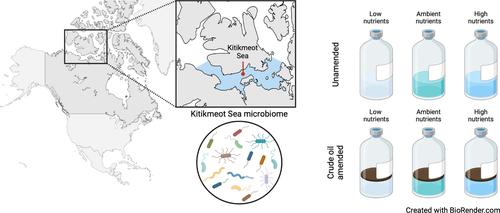当前位置:
X-MOL 学术
›
Environ. Microbiol.
›
论文详情
Our official English website, www.x-mol.net, welcomes your
feedback! (Note: you will need to create a separate account there.)
Novel oil‐associated bacteria in Arctic seawater exposed to different nutrient biostimulation regimes
Environmental Microbiology ( IF 4.3 ) Pub Date : 2024-10-17 , DOI: 10.1111/1462-2920.16688 Francisco D. Davila Aleman, María A. Bautista, Janine McCalder, Kaiden Jobin, Sean M. C. Murphy, Brent Else, Casey R. J. Hubert
Environmental Microbiology ( IF 4.3 ) Pub Date : 2024-10-17 , DOI: 10.1111/1462-2920.16688 Francisco D. Davila Aleman, María A. Bautista, Janine McCalder, Kaiden Jobin, Sean M. C. Murphy, Brent Else, Casey R. J. Hubert

|
The Arctic Ocean is an oligotrophic ecosystem facing escalating threats of oil spills as ship traffic increases owing to climate change‐induced sea ice retreat. Biostimulation is an oil spill mitigation strategy that involves introducing bioavailable nutrients to enhance crude oil biodegradation by endemic oil‐degrading microbes. For bioremediation to offer a viable response for future oil spill mitigation in extreme Arctic conditions, a better understanding of the effects of nutrient addition on Arctic marine microorganisms is needed. Controlled experiments tracking microbial populations revealed a significant decline in community diversity along with changes in microbial community composition. Notably, differential abundance analysis highlighted the significant enrichment of the unexpected genera Lacinutrix , Halarcobacter and Candidatus Pseudothioglobus . These groups are not normally associated with hydrocarbon biodegradation, despite closer inspection of genomes from closely related isolates confirming the potential for hydrocarbon metabolism. Co‐occurrence analysis further revealed significant associations between these genera and well‐known hydrocarbon‐degrading bacteria, suggesting potential synergistic interactions during oil biodegradation. While these findings broaden our understanding of how biostimulation promotes enrichment of endemic hydrocarbon‐degrading genera, further research is needed to fully assess the suitability of nutrient addition as a stand‐alone oil spill mitigation strategy in this sensitive and remote polar marine ecosystem.
中文翻译:

暴露于不同营养生物刺激方案的北极海水中的新型石油相关细菌
北冰洋是一个贫营养生态系统,由于气候变化引起的海冰消退,随着船舶交通量的增加,石油泄漏的威胁不断升级。生物刺激是一种减少溢油的策略,涉及引入生物可利用的营养物质,以增强地方性石油降解微生物对原油的生物降解。为了使生物修复为未来在极端北极条件下的溢油缓解提供可行的应对措施,需要更好地了解营养添加对北极海洋微生物的影响。追踪微生物种群的对照实验显示,随着微生物群落组成的变化,群落多样性显着下降。值得注意的是,差异丰度分析突出了意想不到的 Lacinutrix、Halarcobacter 和 Candidatus Pseudothioglobus 属的显着富集。这些群体通常与碳氢化合物生物降解无关,尽管对密切相关分离株的基因组进行了更仔细的检查,证实了碳氢化合物代谢的潜力。共现分析进一步揭示了这些属与众所周知的碳氢化合物降解细菌之间的显着关联,表明在石油生物降解过程中存在潜在的协同相互作用。虽然这些发现拓宽了我们对生物刺激如何促进地方性碳氢化合物降解属富集的理解,但需要进一步的研究来全面评估在这个敏感和偏远的极地海洋生态系统中,营养添加作为独立溢油缓解策略的适用性。
更新日期:2024-10-17
中文翻译:

暴露于不同营养生物刺激方案的北极海水中的新型石油相关细菌
北冰洋是一个贫营养生态系统,由于气候变化引起的海冰消退,随着船舶交通量的增加,石油泄漏的威胁不断升级。生物刺激是一种减少溢油的策略,涉及引入生物可利用的营养物质,以增强地方性石油降解微生物对原油的生物降解。为了使生物修复为未来在极端北极条件下的溢油缓解提供可行的应对措施,需要更好地了解营养添加对北极海洋微生物的影响。追踪微生物种群的对照实验显示,随着微生物群落组成的变化,群落多样性显着下降。值得注意的是,差异丰度分析突出了意想不到的 Lacinutrix、Halarcobacter 和 Candidatus Pseudothioglobus 属的显着富集。这些群体通常与碳氢化合物生物降解无关,尽管对密切相关分离株的基因组进行了更仔细的检查,证实了碳氢化合物代谢的潜力。共现分析进一步揭示了这些属与众所周知的碳氢化合物降解细菌之间的显着关联,表明在石油生物降解过程中存在潜在的协同相互作用。虽然这些发现拓宽了我们对生物刺激如何促进地方性碳氢化合物降解属富集的理解,但需要进一步的研究来全面评估在这个敏感和偏远的极地海洋生态系统中,营养添加作为独立溢油缓解策略的适用性。






























 京公网安备 11010802027423号
京公网安备 11010802027423号